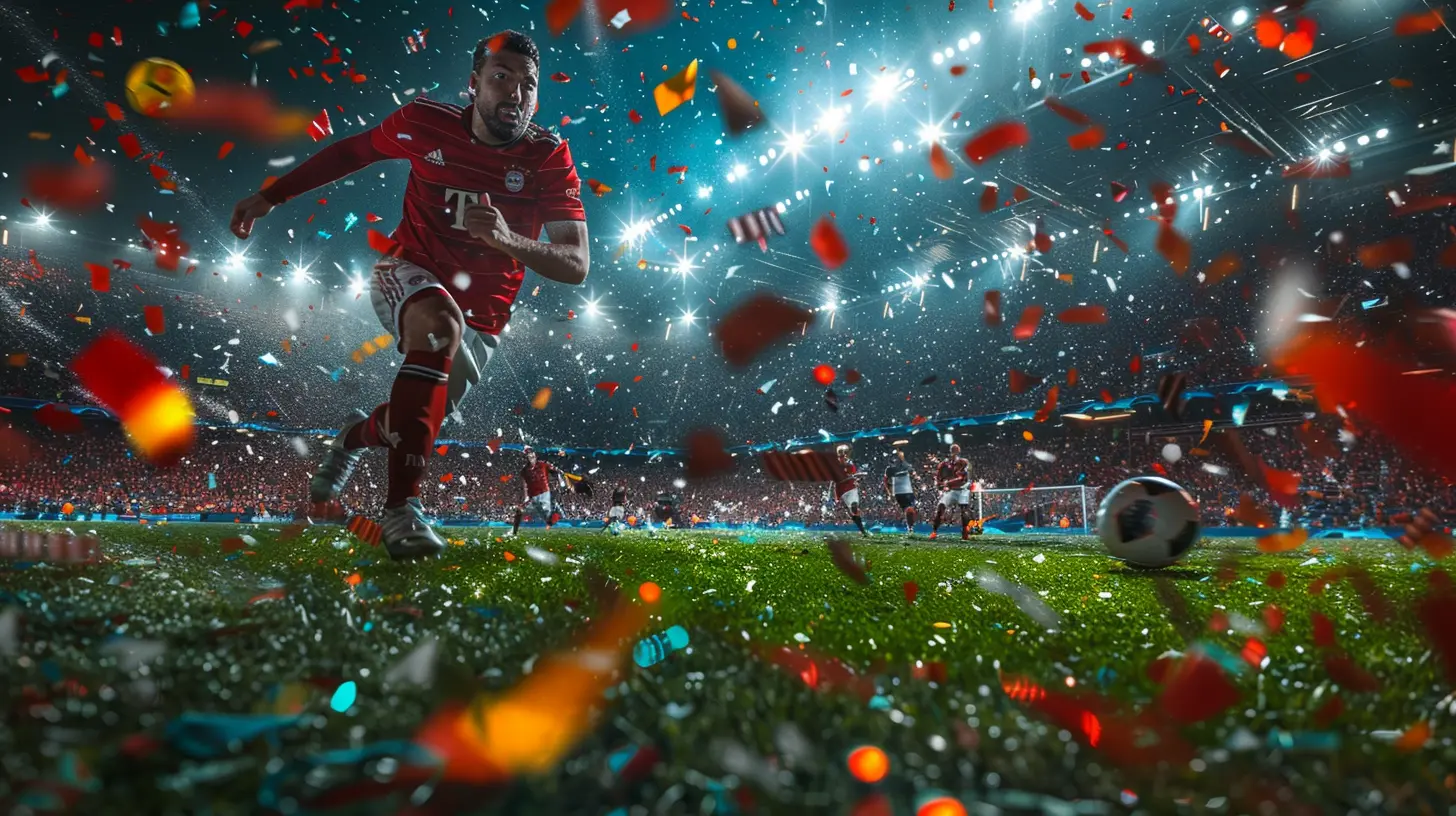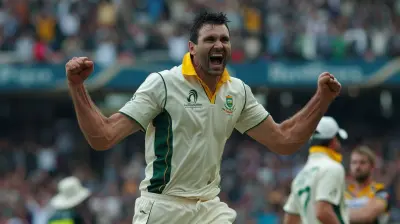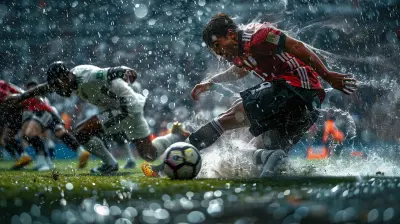Strategic Mastery: A Lesson in How to Win the Big Games
18 May 2025
In the world of sports, big games are where legends are made, where the pressure is intense, and the stakes are sky-high. Whether it’s the Super Bowl, the NBA Finals, the World Cup, or even the Olympics, winning the big games requires more than just talent. It’s about strategy, mental toughness, and the ability to execute when it matters most.
So, how do the great teams and athletes pull it off? How do they rise above the noise and chaos to secure victory on the grandest stage? Well, it's not magic. It’s strategic mastery. Let's dive into how these masters of the game do what they do—and how you can learn a thing or two from them.

The Importance of Preparation
They say, “By failing to prepare, you are preparing to fail.” And this couldn’t be truer when it comes to winning big games. Preparation is the foundation that allows athletes to perform at their peak when it matters most.Studying the Opposition
You can’t just show up on game day and expect to wing it. The best teams dedicate hours upon hours to studying their opponents. They analyze game footage, looking for tendencies, weaknesses, and patterns. These insights give them an edge, allowing them to exploit their opponent's flaws while minimizing their own weaknesses.Think of it like playing chess. You wouldn’t go into a match without knowing your opponent’s favorite opening moves, right? Sports work the same way. Whether it's a quarterback reading a defense or a soccer team preparing for a specific formation, knowing your opponent inside and out is crucial.
Mental Preparation
But it's not all about X's and O's. Big games are often won in the mind as much as they are on the field. Athletes and teams that succeed in high-pressure situations have mastered the art of mental preparation. Visualization is a big part of this. By mentally rehearsing how they’ll react to different scenarios, athletes build confidence and reduce anxiety.Think about it: If you’ve already “seen” yourself making the game-winning shot or scoring the decisive goal in your mind, it won’t feel so foreign when you actually have to do it.

Execution Under Pressure
There’s a reason why some players are called “clutch” and others fold under pressure. When the lights are brightest, and the clock is ticking down, great teams and athletes execute. But what makes them so good at it?Staying Calm in the Chaos
One of the biggest factors is the ability to stay calm when everything around you is chaotic. In big games, emotions run high, and the pressure can feel overwhelming. The best teams maintain their composure, even when things aren’t going their way.Take Tom Brady, for example. The guy is a master of staying calm under pressure. Whether he's down by 25 points in the Super Bowl or facing a last-minute drive, Brady’s heart rate barely changes. His ability to keep cool allows him to think clearly, make smart decisions, and execute the game plan flawlessly.
Trusting the Process
Execution under pressure also comes down to trusting the process. Great teams don’t abandon their game plan just because they’re behind or facing adversity. They stick to what got them there and trust that their preparation will pay off.It’s like a marathon runner who paces themselves for 20 miles and doesn’t suddenly sprint the last six miles just because they’re feeling good. Sticking to the plan and executing consistently is often what separates champions from everyone else.

Adjusting on the Fly
Of course, no game ever goes exactly as planned. That’s why the best teams and athletes are also masters of in-game adjustments. They’re able to adapt to changing circumstances and make the necessary tweaks to stay one step ahead.Reading the Game
The key here is awareness. Great athletes and teams read the flow of the game and adjust accordingly. It’s like a boxer who realizes their opponent is favoring their left side and shifts their strategy to target that weakness.In basketball, for example, if the opposing team suddenly switches to a zone defense, the well-prepared team will quickly adjust their offense to exploit the open spaces. Similarly, in football, if the defense starts blitzing more aggressively, the quarterback might call for quicker, short passes to neutralize the pressure.
Halftime Adjustments
Let’s not forget about halftime. It’s one of the most critical moments in any big game. Teams and coaches use this time to reassess what’s been working and what hasn’t. They make adjustments based on what they’ve seen, whether it’s changing their defensive scheme, subbing in fresh legs, or tweaking their offensive strategy.The ability to adjust on the fly is what makes teams like the New England Patriots or the Golden State Warriors so dangerous. They don’t panic when things aren’t going well. They regroup, make the necessary changes, and come out stronger in the second half.

Mastering Team Dynamics
No matter how talented an individual player is, big games are almost always won by teams, not individuals. And mastering team dynamics is a crucial element of strategic mastery.The Role of Leadership
Great teams have great leaders. Whether it’s the coach or a veteran player, strong leadership is what keeps a team focused and motivated when the pressure is on. Leaders set the tone, both in preparation and during the game itself.Think of Michael Jordan during the Chicago Bulls’ dynasty. Sure, he was one of the most talented players ever, but it was his leadership and ability to inspire his teammates that elevated the entire team. He wasn’t just playing for himself; he was pushing everyone around him to be better.
Trust and Communication
Teamwork doesn’t just happen. It’s built on trust and communication. In big games, trust is everything. Teammates need to trust each other to execute their roles and stick to the game plan. If one player tries to do too much on their own, it can throw everything off balance.Communication is also key. Whether it’s calling out defensive assignments in basketball or making audibles in football, communication ensures that everyone is on the same page. Teams that communicate well are able to adjust more quickly and smoothly, which can make all the difference in a tight game.
The Role of Experience
Experience is one of those intangible factors that often separates the winners from the losers in big games. Teams that have been there before know what to expect, and that knowledge can be invaluable.Learning From Past Failures
Many great teams and athletes had to go through failure before they could taste victory. The 2014 San Antonio Spurs, for example, used their heartbreaking loss in the 2013 NBA Finals as motivation to come back stronger. They learned from their mistakes, made adjustments, and ultimately won the championship the following year.Failure teaches valuable lessons. It reveals weaknesses, both mental and physical, that need to be addressed. Teams that can embrace failure and use it as a learning tool are often the ones that come out on top the next time they’re in that high-pressure situation.
Knowing What It Takes
Experience also gives athletes and teams the knowledge of what it takes to win at the highest level. They understand the level of focus, discipline, and intensity required. They’ve been through the gauntlet and come out the other side, so they know what’s needed to get the job done.It’s like a seasoned mountain climber who’s already summited Everest. They know the terrain, the challenges, and the risks. That experience makes them far more prepared for the journey than someone who’s attempting it for the first time.
The X-Factor: Belief
At the end of the day, talent, preparation, and strategy will only get you so far. The true X-factor in winning the big games is belief. The best teams and athletes believe, deep down, that they are going to win.Confidence vs. Cockiness
Now, there’s a fine line between confidence and cockiness. Confidence comes from preparation and hard work. It’s the quiet belief in your abilities and your team. Cockiness, on the other hand, is often just bravado without substance.The great teams have confidence because they’ve put in the work. They trust themselves and their teammates to perform when it counts. When you believe you’re going to win, you play with a different energy. You take risks, you stay composed under pressure, and you go the extra mile.
Creating a Winning Culture
Belief isn’t just about individual confidence. It’s about creating a winning culture within the team. Teams like the All Blacks in rugby or the New England Patriots in football don’t just hope to win— they expect to win. That culture of winning becomes infectious, and everyone buys into it.When a team believes in itself, special things happen. Belief creates momentum, and momentum can be an unstoppable force in sports. It’s the reason we see so many miraculous comebacks and “Cinderella stories” in big games. Belief breeds success.
Conclusion: Putting It All Together
Winning the big games requires a combination of preparation, execution, adaptability, teamwork, experience, and belief. It’s not just about being the most talented team on the field, court, or pitch. It’s about mastering the mental and strategic aspects of the game.So, the next time you watch a big game, pay attention to how the winning team operates. Notice how they prepare, execute, adjust, and, most importantly, how they believe in themselves. Because at the end of the day, that’s what makes the difference between winning and losing when the stakes are at their highest.
all images in this post were generated using AI tools
Category:
Match HighlightsAuthor:

Nelson Bryant
Discussion
rate this article
3 comments
Juniper Bowman
Winning the big games isn't just about talent—it's a chess match of strategy. When the pressure mounts, it's the clever moves that turn the tide. Here’s to the coaches and players who master the art of sportsmanship!
June 7, 2025 at 4:20 AM

Nelson Bryant
Absolutely! Strategy and sportsmanship are key to success in high-pressure moments. It’s inspiring to see how great coaches and players elevate their game when it counts the most.
Ariadne Mercado
This article brilliantly highlights the importance of strategy in winning crucial games—an essential read for aspiring coaches and players!
June 1, 2025 at 8:33 PM

Nelson Bryant
Thank you for your kind words! I'm glad you found the article helpful for coaches and players alike.
Rusty McGillivray
Absolutely loved this article! It brilliantly highlights the importance of strategy in winning crucial games. The insights provided are not only informative but also inspiring for both players and coaches. Can't wait to see these tactics in action!
May 30, 2025 at 4:20 AM

Nelson Bryant
Thank you so much! I'm thrilled you found the insights valuable and inspiring. Excited to see these strategies in action too!



